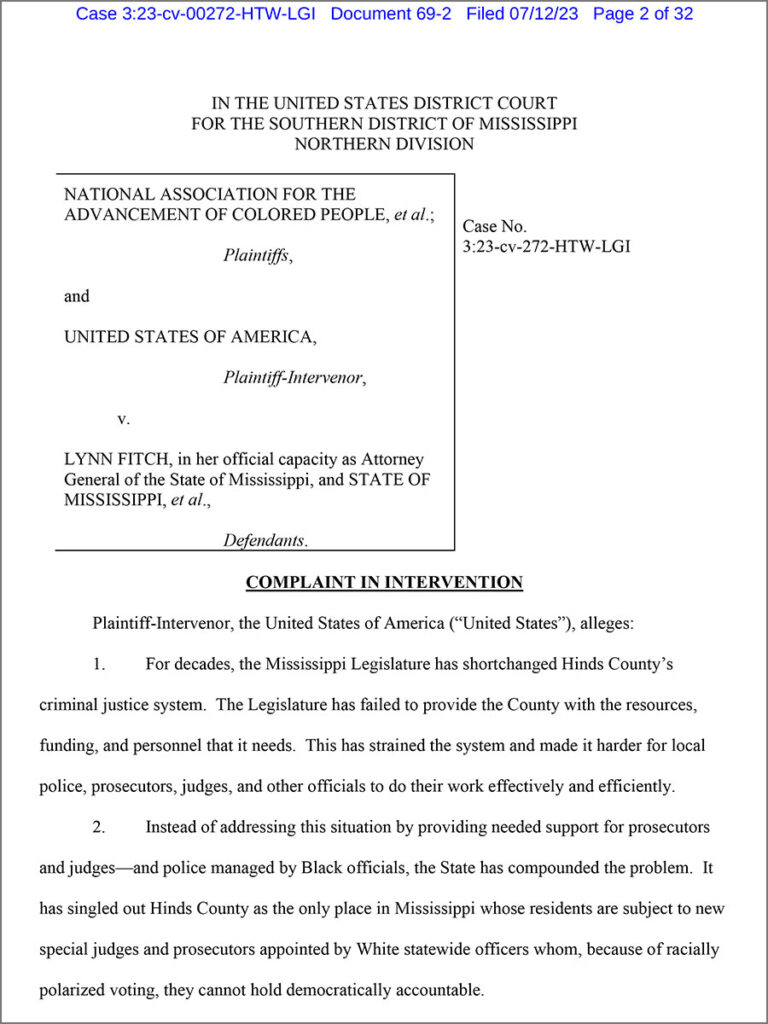Mississippi House Bill 1020 is “racially discriminatory” because it shifts “authority over the county’s criminal justice system away from democratically-elected judges and prosecutors elected by Black voters,” the U.S. Department of Justice said Wednesday as it filed a complaint in federal court.
“Mississippi state lawmakers have adopted a crude scheme that singles out and discriminates against Black residents in the City of Jackson and Hinds County,” Assistant Attorney General Kristen Clarke of the Justice Department’s Civil Rights Division said in a statement this afternoon. “Our complaint alleges that Mississippi has violated the U.S. Constitution by creating a new, two-tiered system of justice—which erodes the authority of Black elected local officials and creates a new system to be led by judges and prosecutors hand-picked and appointed by state officials.”
H.B. 1020 gives the white Mississippi Supreme Court chief justice, Michael K. Randolph, the power to appoint unelected judges to serve in majority-Black Hinds County, where the capital City of Jackson is located. Under the law, the chief justice would appoint four new judges to serve in the Hinds County Circuit Court until 2026 and one permanent municipal judge to serve in the Capitol Complex Improvement District. Mississippi Attorney General Lynn Fitch, who is also white, would appoint special two prosecutors in the new CCID court.

Legislative leaders said during debate over H.B. 1020 that their goal was to make Jackson safer and fight crime. Opponents of the law have long argued that the appointments will take power away from mostly Black locally elected circuit court judges and diminish Black voters’ power in Hinds County. Hinds County is 70% Black, and Jackson is 80% Black.
“This thinly-veiled state takeover is intended to strip power, voice and resources away from Hinds County’s predominantly-Black electorate, singling out the majority Black Hinds County for adverse treatment imposed on no other voters in the State of Mississippi,” Clarke said in Wednesday’s statement. “The Civil Rights Division of the Department of Justice remains committed to identifying and challenging all acts of discrimination targeting Black communities.”
With its complaint, the Justice Department seeks to intervene in an NAACP-led federal court case in the U.S. District Court for the Southern District of Mississippi in Jackson; Judge Henry T. Wingate is presiding over the case. The Mississippi Supreme Court heard arguments in a separate state-level case over H.B. 1020 last week, but the justices have yet to render a decision.
For decades, the Justice Department’s complaint alleges, “the Mississippi Legislature has shortchanged Hinds County’s justice system” and “failed to provide the county with the resources, funding, and personnel that it needs.”
“This has strained the system and made it harder for local police, prosecutors, judges, and other officials to do their work effectively and efficiently,” it continues. “Instead of addressing this situation by providing needed support for prosecutors and judges—and police managed by Black officials, the State has compounded the problem. It has singled out Hinds County as the only place in Mississippi whose residents are subject to new special judges and prosecutors appointed by White statewide officers whom, because of racially polarized voting, they cannot hold democratically accountable.”
The 31-page complaint alleges that H.B. 1020’s special appointments violate the Equal Protection Clause of the 14th Amendment.
“One of the hallmarks of justice and the United States Constitution is equal protection under the law,” U.S. Attorney Darren J. LaMarca for the Southern District of Mississippi said in Wednesday’s DOJ statement. “We want to ensure that the citizens of Hinds County and Jackson, Mississippi, are treated equally in the support and operation of their criminal justice system.”
The complaint notes that, if H.B. 1020 goes into effect, at least 50% of circuit judges in Hinds County will be will appointed by the white chief justice rather than elected by Hinds County’s majority-Black voters. It also points out that, before lawmakers passed H.B. 1020, the House majority killed an amendment that would have required CCID judges to be residents of Hinds County.
“If we’re going to make an additional court in the City of Jackson, do we not want our best and brightest sitting in judgment, whether that may come from Holmes County or Madison County or wherever they may be? Why would we limit the talent pool to here?” Rep. Trey Lamar, the bill’s sponsor and a white Republican who lives 170 miles north of Jackson in Senatobia, Miss., said on the House floor in February.

The complaint cites those remarks and others by Lamar, describing them as “racially tinged statements” that “(treat) Hinds County and Jackson as if they are incapable of effective self-governance.”
“After Rep. Lamar stated that the bill’s purpose is to make the City of Jackson safer, bill opponents replied that Black representatives of Jackson, rather than White statewide officials, should oversee their city,” the complaint recounts. “Representative Lamar responded that ‘the city of Jackson is the capital city of the State of Mississippi, whether you are from Southaven or Gulfport. It is our capital city. It does not belong solely to the citizens of Jackson, OK?‘”
In a statement Wednesday, the NAACP praised the Justice Department’s action, with NAACP President Derrick Johnson calling it “exemplary of what good government looks like.”
“When our state leaders fail those they are supposed to serve, it is only right that the federal government steps in to ensure that justice is delivered,” said Johnson, who is a Mississippi native. “The NAACP is proud to have led the charge in holding Gov. Reeves and the legislators who advanced these bills accountable for their attempts to undermine democracy and silence the voices of Black Mississippians. This fight is far from over, and with the Department of Justice moving to join us, we are more hopeful than ever that this case will result in a positive outcome for Jackson.”










